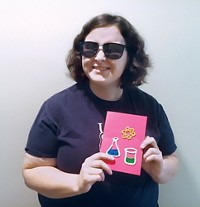Advertisement
Grab your lab coat. Let's get started
Welcome!
Welcome!
Create an account below to get 6 C&EN articles per month, receive newsletters and more - all free.
It seems this is your first time logging in online. Please enter the following information to continue.
As an ACS member you automatically get access to this site. All we need is few more details to create your reading experience.
Not you? Sign in with a different account.
Not you? Sign in with a different account.
ERROR 1
ERROR 1
ERROR 2
ERROR 2
ERROR 2
ERROR 2
ERROR 2
Password and Confirm password must match.
If you have an ACS member number, please enter it here so we can link this account to your membership. (optional)
ERROR 2
ACS values your privacy. By submitting your information, you are gaining access to C&EN and subscribing to our weekly newsletter. We use the information you provide to make your reading experience better, and we will never sell your data to third party members.
Education
A Weighty Issue
by Rudy M. Baum
September 8, 2008
| A version of this story appeared in
Volume 86, Issue 36
EVERY WEEK, we strive to bring you a magazine that keeps you informed of the broad chemical enterprise. This week's issue pulls out all the stops. It contains many engaging, informative, important, and inspiring stories and features that remind us once again just how dynamic the chemical enterprise is.
Permit me to skip around a bit so I don't start with the obvious. Just because it falls at the end of the magazine, after the traditional "back of the book material," do not overlook the outstanding stories in this year's Education Supplement. This feature was coordinated and edited by Corinne Marasco, a senior editor in the ACS News & Special Features Department. Marasco also wrote the introduction to the feature and "The Ivory Tower Goes Green," a story that shows how green chemistry in the curriculum can inspire professors and students alike.
Marasco writes that "all of the faculty members C&EN spoke with say that green chemistry outreach efforts have brought positive feedback for their departments and for their schools and have given their departments a higher profile on campus and even in the international community. Those efforts have also had a positive impact on enrollment and interest in green chemistry among both majors and nonmajors."
Other stories in the supplement focus on the recently held ACS Summer School on Sustainability & Green Chemistry, the challenges facing nuclear and radiochemistry programs in the U.S., research at primarily undergraduate universities, and academic sabbaticals.
C&EN takes the material in the back of the book just as seriously as it takes the material in the front of the book. This week's issue contains two features of great importance and interest to ACS members. One is the "Candidates Election Statements and Backgrounds" in which this year's candidates for ACS national offices present their visions for ACS and their arguments for their candidacies.
The slate of candidates is very strong, led by two highly qualified candidates for ACS president-elect, Joseph S. Francisco, a chemistry professor at Purdue University, and Josef Michl, a chemistry professor at the University of Colorado, Boulder. I urge you to read the statements of all of the candidates, even those you may not be eligible to vote for. They all have important things to say about the future of the chemical enterprise and the future of ACS. And I urge you to vote in the upcoming election. Remember, you can vote by paper ballot or online. I've voted online in the past two ACS presidential elections; it is fast and easy.
Also in this week's issue is a list that everyone anticipates each year, the announcement of next year's ACS national award winners. ACS presents nearly 60 prestigious awards each year, and now you know who will be the deserving recipients of the 2009 awards.
There are, of course, the usual departments in the issue, and the stories in them span a wide gamut, from groundbreaking science, to niches in chemical business, to difficult policy issues, to the dark side of chemistry.
On the policy side, for example, Senior Editor Cheryl Hogue examines the climate-change challenges that will face either John McCain or Barack Obama when one of them becomes U.S. president in 2009. "Looming on the horizon," Hogue writes, "is a long-planned United Nations meeting in December 2009, when countries are hoping to complete a new treaty to control greenhouse gas emissions." Both Obama and McCain support a more robust U.S. approach to curbing such emissions than does President Bush, but the difficulties either will face are daunting, Hogue suggests.
Not every story in chemistry is a happy one. In the Science & Technology Department, for example, Associate Editor Jyllian Kemsley writes about a University of California, Merced, chemistry graduate student arrested for stealing university property to manufacture methamphetamine and the issues chemistry departments face in balancing security with academic freedom.
There's a lot to cover in the chemical enterprise.
Thanks for reading.
Views expressed on this page are those of the author and not necessarily those of ACS.




Join the conversation
Contact the reporter
Submit a Letter to the Editor for publication
Engage with us on Twitter